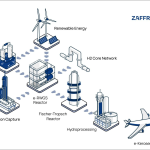Heathrow, one of the busiest international airports in the world, has increased its annual incentive for airlines to adopt the use of sustainable aviation fuel when refuelling at the airport. Now in its fourth year, the scheme will make available £86 million ($106m) to support the switch by airlines to cleaner fuels by approximately halving the current price gap with kerosene, so making SAF more commercially viable. Heathrow is targeting 3% of aviation fuel used in 2025 to be SAF, amounting to 187,000 tonnes, so saving around 500,000 tonnes of lifecycle carbon emissions from flights. As an update to its Heathrow 2.0 sustainability strategy, the airport has also published a ‘Nature Positive Plan’, which outlines a commitment “to better understand and, where possible, reduce Heathrow’s impacts on nature.” Meanwhile, reports suggest the UK government is shortly to announce supporting expansion of the airport, including a third runway, as well as approving full use of a second runway at Gatwick.
This year’s SAF incentive from Heathrow aims to align with the airport’s goal to be 1% above the 10% target for 2030 set under the new UK SAF mandate introduced this month.
“Sustainable aviation fuel is no longer a future promise – it’s a proven solution that is powering flights worldwide. Our SAF incentive scheme, part of our Connecting People and Planet sustainability strategy, has made significant progress and we’re now exploring options to set a long-term incentive signal to 2030,” commented Matt Gorman, Heathrow’s Director of Carbon Strategy.
“We are delighted that the government has moved quickly to legislate the SAF mandate. We must now accelerate legislation for the SAF revenue certainty mechanism to ensure we can build a domestic industry that will help decarbonise and drive economic growth.”
Key commitments in the Nature Positive Plan include using nature-based solutions wherever feasible; expanding nature networks around the airport to support ecological resilience; improving biodiversity management; supporting nature-based carbon removal; and, claims Heathrow, being the first airport in the world to commit to adopting the Taskforce on Nature-related Financial Disclosures (TNFD) recommendations for annually reporting on the airport’s impacts and dependencies on nature.
The “refreshed” overall sustainability strategy introduces more ambitious goals in areas where significant progress has been achieved, says the airport, adding: “It highlights clear progress and increased ambitions in priority areas, including reducing noise impacts, improving air quality and supporting the local community.”
These priority areas, along with decarbonisation, are likely to become the focus of sharp scrutiny shortly, with signals indicating the UK government may be about to give approval for the expansion of Heathrow, to include a new third runway, as part its economic growth plans for the nation. A third runway received policy support from the previous government through an Airports National Policy Statement but in the face of concerted opposition on environmental and climate grounds, Heathrow has yet to submit a planning application. Heathrow CEO Thomas Woldbye has said it needed a “clear steer” from the government by the end of 2025 before committing to self-financed expansion.
The government is also minded to approve plans submitted by London Gatwick Airport, the UK’s second busiest airport, to increase capacity from around 40 million passengers a year to 75 million by the late 2030s and bring its backup second runway into routine operation. Luton Airport, just north of London, may also get support for its terminal expansion plan.
Governments down the decades have considered capacity expansion in the south-east of England, where no full-length runway has been built since the 1940s. Heathrow is the busiest two-runway airport and Gatwick the busiest single-runway airport in the world.
However, a group of environmental NGOs has already written a letter to the government expressing concerns over the expansion plans. They say any airport expansion goes against guidance from the government’s own advisory Climate Change Committee and that there is low confidence over the rate of SAF scale-up to guarantee reductions of aviation industry emissions. They also cite 2023 analysis by social, economic and environmental justice think-tank the New Economics Foundation that called into doubt the economic benefits of expanding the UK air transport sector.
On the other hand, the GMB trade union welcomed the prospect of a third Heathrow runway. “Expanded capacity at the airport is crucial for our country’s prosperity and has been put off for far too long,” said Andy Prendergast, GMB National Secretary. “The extra runway is crucial to create thousands of good, union jobs. The sooner the project is progressed, the better.”
Photo: Heathrow Airport














More News & Features
Regional SAF News February 2026
SkyNRG reaches financial close for Dutch 100,000-tonne SAF facility
Concrete Chemicals consortium secures €350m public funding for German eSAF project
UK regulator sets out guidance for providing emissions data to passengers booking flights
SAF One announces new investment and technology partners for Middle East SAF project
New initiative formed to accelerate SAF adoption and production in the Pacific Northwest